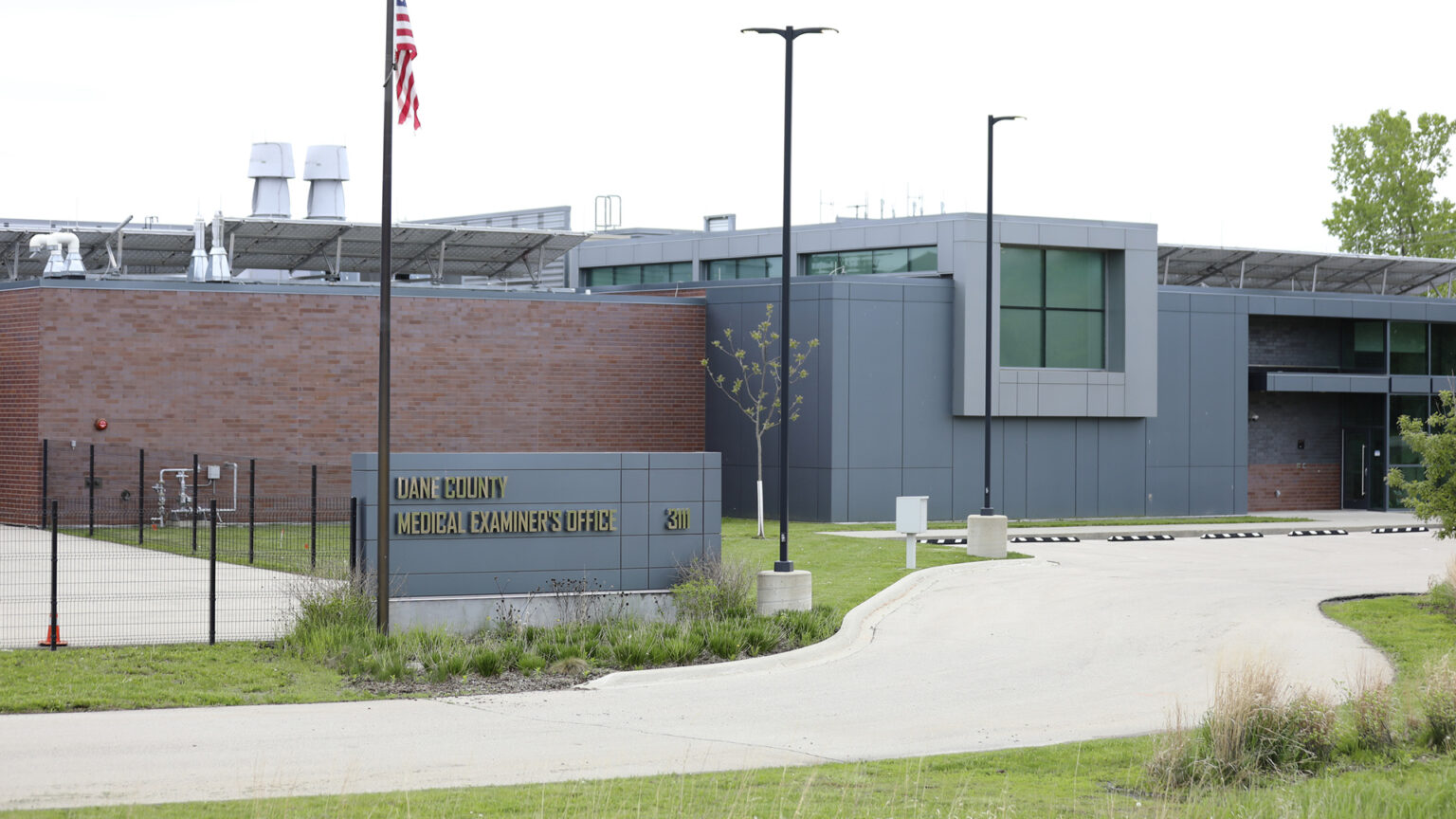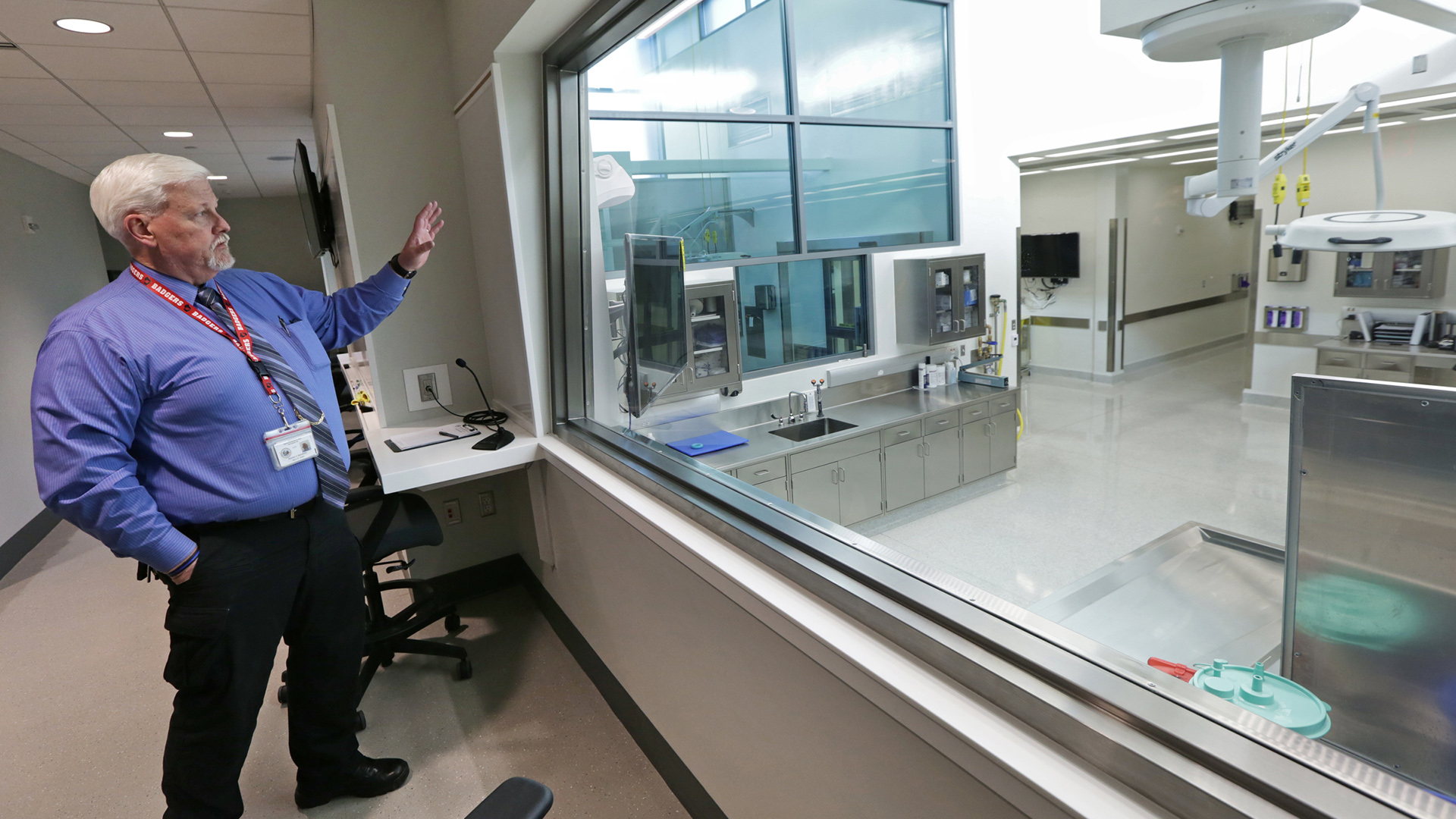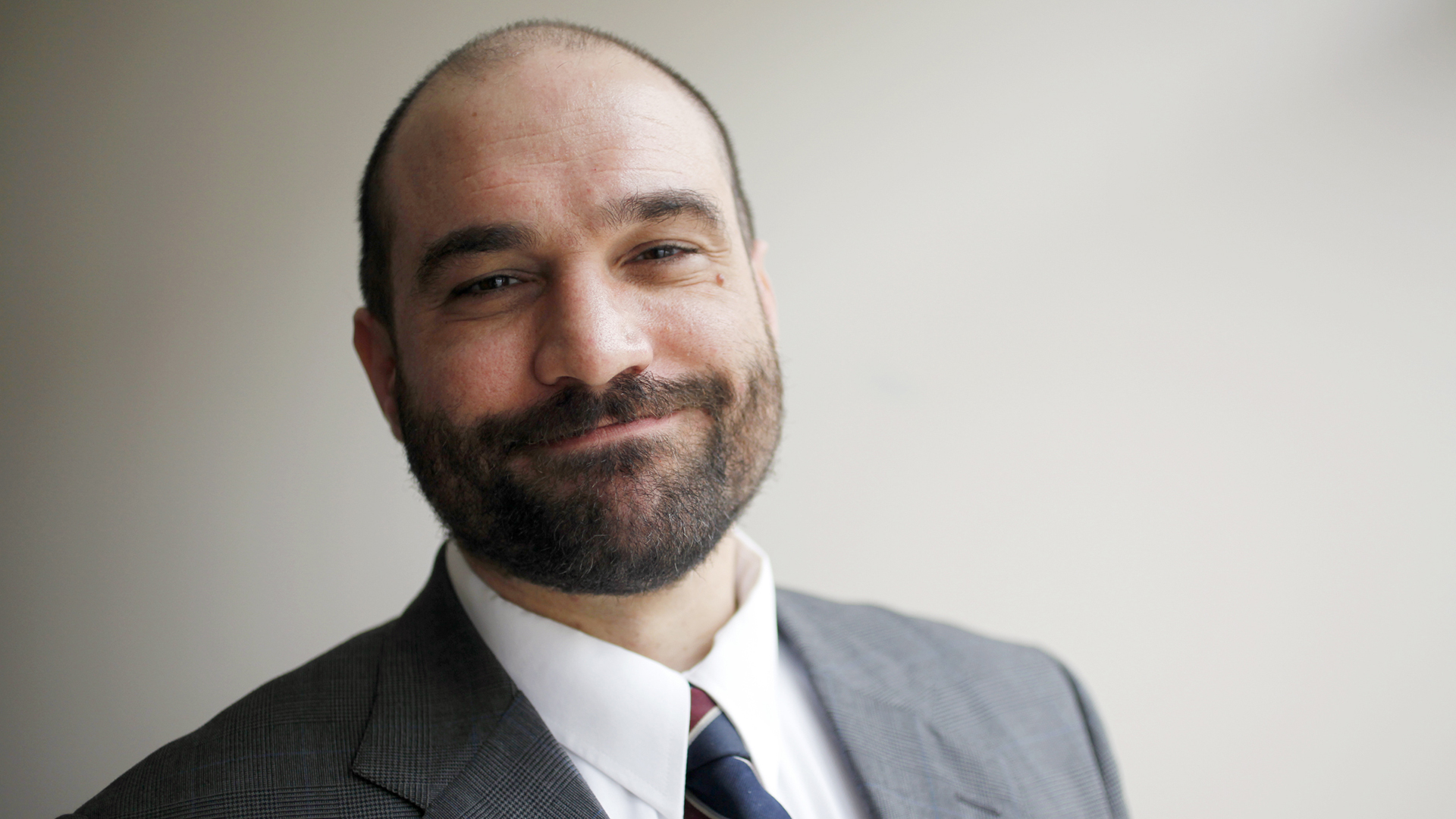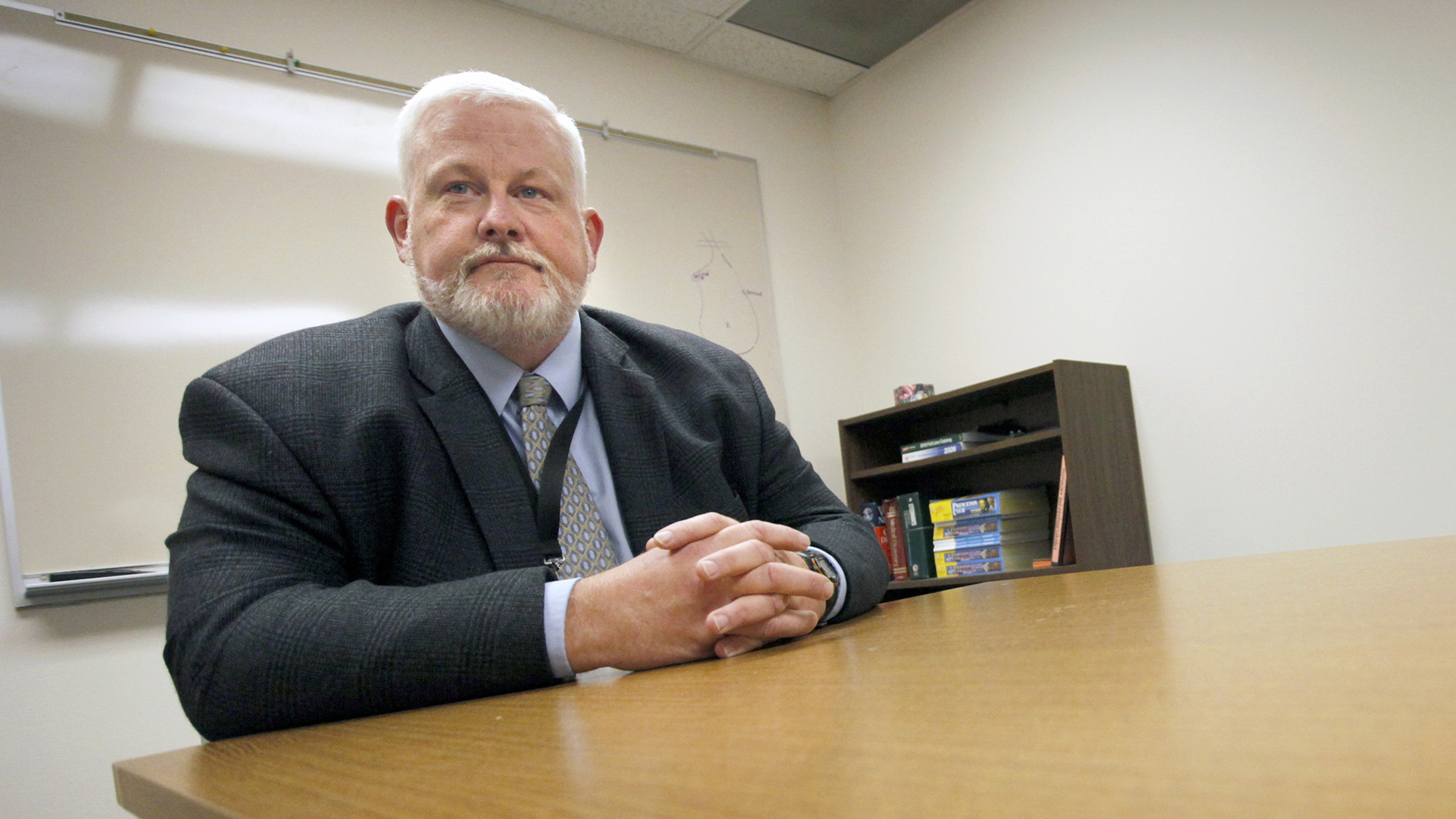'Toxic work environment' in Dane County Medical Examiner's Office pushes employees to the brink
Staffers say the county refused action as yelling, insults and unrelenting demands damaged their mental health, while the alleged behavior causes other counties to cut ties.
Wisconsin Watch
May 26, 2022 • South Central Region

Former pathologists in the Dane County Medical Examiner's Office in McFarland, said they left the office, giving up lucrative contracts, rather than accept management that they said jeopardized their mental health. Photo taken May 18, 2022. (Credit: Coburn Dukehart / Wisconsin Watch)

By Brenda Wintrode, Wisconsin Watch
The Dane County Medical Examiner’s Office in April rehired an unpopular former operations director, prompting his shocked colleagues to make public longstanding complaints that he and his bosses created “a toxic work environment” that top county officials failed to fix.
Twelve current and former employees told Wisconsin Watch that they regularly endured bullying, screaming and insults from two of their bosses: Barry Irmen, who served as operations director from 2011 until January, when he retired, returning to the office on a part-time, interim basis on April 27; and Dr. Agnieszka Rogalska, who rose to chief medical examiner in January after eight years as deputy chief medical examiner.
Former pathologists said they gave up lucrative contracts with the office to preserve their mental health.
High employee turnover worsened a backlog of pending autopsy cases, leaving families waiting for death certificates needed for closure or insurance payouts, multiple employees said.
The alleged toxicity spilled into other counties, where some officials said they avoided or halted their relationships with the Dane County Medical Examiner’s Office, citing behavior by Irmen and Rogalska that allegedly included yelling at an Oconto County chief deputy medical examiner in her living room.
Multiple employees accused Dr. Vincent Tranchida of standing idle while witnessing animosity that spanned more than a decade. Rogalska replaced Tranchida, who now is a deputy medical examiner.
In an email to Wisconsin Watch, Tranchida denied witnessing Irmen or Rogalska yell, scream or “interact with employees in a way that was unprofessional.” Nor had Tranchida noticed increased stress in the office since Irmen’s return, he wrote.
But he said he had “fielded questions and concerns regarding multiple members of my staff at various levels of employment, including Dr. Rogalska and Barry Irmen. These concerns were discussed and investigated, and corrective actions taken where needed.”
Rogalska, who pulls a $331,780 annual salary, denied the accusations. “I have never screamed, insulted or bullied any employee or witnessed the same from any other employee,” she wrote in a statement.
Irmen, who makes $90 an hour, also denied yelling or screaming at employees in the office. “I do not believe that the environment (is) toxic or hostile,” he said in a statement, adding: “Part of every job has something that we don’t enjoy doing or like to have to do.”

Barry Irmen is shown outside of an autopsy room in Madison on Jan. 12, 2018. The longtime Dane County Medical Examiner’s Office operations director retired in January 2022 and was rehired in April on an interim basis. Twelve current and former employees told Wisconsin Watch that they endured screaming and insults from Irmen and Dr. Agnieszka Rogalska, the chief medical examiner, who oversaw what they describe as a toxic workplace. Irmen and Rogalska deny the allegations. (Credit: Amber Arnold / Wisconsin State Journal)
Tensions peaked in April after Sue Eskola resigned as operations director four months into Irmen’s brief retirement, according to Brian Standing, president of AFSCME Local 1871, Dane County’s public sector employee union chapter. That’s when Rogalska announced Irmen’s temporary return during the search for Eskola’s replacement.
Standing said he fielded an “onrush” of calls from concerned union members following the reshuffling. Complaints about Irmen’s behavior trickled in for a decade, Standing said, but few advanced because employees hesitated to document interactions.
“People have been really, really afraid of retaliation,” Standing said. “And so they haven’t been willing to stick their necks out to do that.”
Until now.
Speaking to Wisconsin Watch, current and former investigators, autopsy technicians and pathologists described hostile working conditions. All said they otherwise loved the work they did. Those who left said they would have stayed under better management.
Five pathologists have started and left the office since 2013, and dozens of other employees have left over the same period, including death investigators, autopsy technicians and administrators, according to a list compiled by current staff. Wisconsin Watch could not independently verify the reasons for each departure.
Tranchida described Rogalska and Irmen as hard-working colleagues with rigorous scientific and professional standards. He added that “some employees may not be compatible with a workplace.”
“We are aware that this work can be very difficult and stressful, and our volume is considerable,” he wrote. “Our goal is always to provide the most scientifically accurate and humane service we can to the public we serve and to support our staff in their work as best we can.”
Workplace culture investigated
In 2020, the county’s Employee Relations Division and the Office for Equity and Inclusion jointly investigated the workplace culture within the medical examiner’s office. The result: Employees received a summary of their concerns alongside reminders of county policies.
The document described office work environment challenges as “similar to other County work environments.” It also appeared to lay blame in part on the complaining employees, stating, “Some staff expressed concerns about co-workers gossiping, spreading rumors and slandering other employees or Management.”

Twelve current and former employees told Wisconsin Watch that they regularly endured bullying, screaming and insults from two of their bosses in the Dane County Medical Examiner’s Office at 3111 Luds Road in McFarland. Photo taken May 18, 2022. (Credit: Coburn Dukehart / Wisconsin Watch)
Multiple employees said conditions have not improved since that report was issued.
“It felt like our voices don’t matter,” said one current investigator who asked to remain anonymous, fearing retaliation. “We all just poured out everything — not to hear anything back.”
Dispute about resignation
Why Eskola — a veteran death investigator — left her operations director role depends upon whom you ask.
Dane County Executive Joe Parisi referred questions to Greg Brockmeyer, Dane County’s director of administration. Brockmeyer did not comment on the investigation or staff complaints.
Brockmeyer wrote in an email that Eskola resigned to “seek another opportunity.” Sources close to the situation said she was pressured to leave. Eskola declined to comment.
“By all accounts, Sue was an excellent supervisor,” Standing said.
Brockmeyer expressed gratitude for Irmen’s return.
“We are appreciative that Barry was willing to return from his retirement to help bridge the gap and ensure the 24/7 nature of the Medical Examiner’s Office can continue to function while the search for the regular, full time replacement of that position is underway,” he wrote in an email.
Addressing Irmen’s return, Brockmeyer wrote: “In accordance with our standard practice, we sought and obtained the County Executive’s oral authorization to proceed with the hire.”
Patrick Miles, the newly elected Board of Supervisors chair and a recent member of the county board’s Personnel and Finance Committee, said he did not know about the office turmoil until a county employee told him in late April. He said the board will examine a reporting system that left county employees too afraid to speak out about workplace treatment.
“We’ve got to adjust the system in some fashion that employees feel safe to be forthright about concerns about their treatment in the workplace.” Miles said.
‘I was jealous of the body on the table’
Dane County has never had its full complement of five budgeted pathologists, which Tranchida and Irmen attributed to a nationwide shortage of candidates. Pathologist Dr. Anita Rajkumar told Wisconsin Watch that the office climate contributed to her suicidal thoughts that eased once she found a new job.
Rajkumar arrived in 2017 after the county recruited her, sponsored her work visa and paid for her to relocate from Canada. Her working relationship with Irmen, Tranchida and Rogalska deteriorated within her first year, she said.
Rogalska agreed to let Rajkumar designate a safe word — banana — to halt escalating arguments, according to Tranchida’s summary of a conversation provided by Rajkumar.
Rajkumar said Rogalska would stand over her shoulder while she edited reports, nitpicking her writing. She said she frequently worked late into the evening or early morning. Rajkumar, who is of East Indian ancestry, said Rogalska once whispered to her that she was a “brown stripe on our flag” and separately scolded her for wearing a tunic over tights and for walking down hallways “very aggressively.”
In a statement, Rogalska denied making any racist remarks about Rajkumar.
During a stretch of 35 consecutive working days, Rajkumar said she scraped her car against a dumpster in the office parking lot due to exhaustion.
She said she contemplated suicide before her parents, friends and colleagues encouraged her to resign and find another employer to sponsor her visa. A therapist who counseled Rajkumar wrote that “her serious mental health issues are solely related to the way she was treated at her job as a medical examiner,” according to a copy of the therapist’s report provided to Wisconsin Watch.
She left her position in 2019 and now works as a medical examiner in New Jersey. “I am extraordinarily happy where I’ve landed,” she said.
Dr. Cori Breslauer, who joined the office as a forensic pathologist in 2020, described similar despair over office working conditions.
Breslauer, who is transgender and uses they/them pronouns, said most colleagues accepted and accomodated their identity. But Irmen and Rogalska would “maliciously misgender me basically until the end of my employment,” Breslauer said. Irmen addressed them repeatedly as “ma’am” even after being told to stop, they said.
Rogalska and Irmen told Wisconsin Watch that they never intentionally misgendered Breslauer, adding that they apologized after any pronoun slip-ups.
Rogalska would repeatedly reject Breslauer’s medical opinions and set unrealistic expectations during on-call shifts that destroyed their personal life, Breslauer said.
“I was jealous of the body on the table,” Breslauer said. “There were days I would come to the office, and I would look at the body on the table and would want to trade places.”
Tranchida offered to help, Breslauer said, but balked at suggestions to change office culture and practices. Tranchida told Wisconsin Watch that Breslauer’s suggested changes would have eroded the office’s quality of service and unequally distributed work.
Breslauer feared retaliation for requesting a sick day to see a counselor, so they never did.
Tranchida declined to comment on Breslauer’s “protected health information” but said he would have directed any employee who was struggling to the Dane County Employee Assistance Program, which offers free counseling services, trauma responses and other resources.
Dane County hired a mediator to work with Bresaluer and Rogalska, but by December 2021, Breslauer had already announced plans to leave. Just weeks before the resignation, Tranchida recommended a 15% merit raise for Bresaluer, citing “exemplary performance.”
Said Breslauer: “I was immediately cured the moment I left that office.”
Treated ‘like we were stupid, northern wood ticks’
The tense environment affected work beyond Dane County.
Under Tranchida, Dane County began contracting autopsy services to other counties, with Irmen overseeing the partnership. It now performs autopsies for Brown, Door, Oconto and Rock counties.

Multiple Dane County Medical Examiner’s Office employees said Dr. Vincent Tranchida failed to address a “toxic work environment” that featured yelling, screaming and bullying for more than a decade. Tranchida told Wisconsin Watch that he never witnessed such behavior. Tranchida was previously chief medical examiner and voluntarily accepted a new role as deputy medical examiner in early 2022. He is shown in a Public Safety Building office in Madison, Wis., on Jan. 28, 2011. (Credit: M.P. King / Wisconsin State Journal)
Dane County might have more partners — and earned more revenue — if not for Irmen’s and Rogalska’s reputations, officials in other counties told Wisconsin Watch.
La Crosse County Chief Medical Examiner Tim Candahl said he asked his county board to halt his office’s relationship with Dane County after things “got testy,” during a six-month partnership in 2013. The partnership worsened rather than eased the workload of his part-time staff, Candahl said.
“I just got to a point where I couldn’t take it no more,” he said.
His experience prompted another small western Wisconsin county to decline to work with Dane County, according to a veteran coroner from that county. The coroner requested anonymity for fear of jeopardizing relationships between medical examiners and coroners.
“Barry made it absolutely awful for everybody in that department,” the coroner said. “Because he was looking over everybody’s shoulder and watching and criticizing everything.”
Other counties said yes to the partnership. Jeff Jansen served as interim chief medical examiner of Brown, Door and Oconto counties in 2015 as their offices transitioned to a contract with Dane County.
He said every deputy medical examiner working for Brown, Door and Oconto counties before the Dane County partnership — about 15 total, he estimated — left because of how Irmen and Rogalska treated them.
The departing deputies included Laurie Parisey of Oconto County, who said Irmen and Rogalska “treated us like we were stupid, northern wood ticks.”
“Dane County was trouble from Day One — absolute nightmare,” said Parisey, who served as Oconto County’s coroner for 14 years, starting in 1992. “It was unfriendly. It was hostile.”
She recalled an episode in which Irmen and Rogalska, unhappy that she called a funeral home too soon, yelled at her in her living room. Parisey said that treatment prompted her to resign.
Rogalska said she and Irmen visited Parisey’s home at Parisey’s request to discuss a policy breach. They did not yell, and the conversation ended amicably, she said.
Irmen attributed tension with counties Dane County contracted with to disagreements over new policies that “required a higher level of forensic investigation as well as more accountability than had existed prior.” Irmen said staff in those counties may have resented their lost autonomy.
“The investigative policies were not well received in many cases, and this ultimately caused frustration with staff and in some cases heated discussion about the need for change,” Irmen’s statement said. “There was no poor treatment.”
‘I can’t deal with this anymore’
Kurt Karbusicky, a longtime Dane County death investigator and former chief deputy coroner, recalled the day in 2013 when he had enough.
He had just returned from a pair of gruesome death scenes — a car crash and a sexual assualt and homicide — when Irmen complained that Karbusicky had not supplemented his teammate’s photos with his own. Irmen yelled at Karbusicky in front of his colleagues, Karbusicky said.
“I felt disappointed. I felt humiliated. I felt belittled. I felt overwhelmingly stressed. Because not only was I dealing with, essentially, a war out in the street, but then I come back, and now I’m fighting a war in the office,” he said.
“That was the day when I just decided, ‘You know what, I can’t deal with this anymore.'”
He resigned and sought counseling for stress.
No more ‘family environment’
Karbusicky started as a Dane County deputy coroner in September 2000. Back then, Coroner Ray Wosepka and John Stanley, his chief deputy, oversaw a “family environment” in which managers helped investigators handle a “crushing” caseload.
But as the office transitioned away from a coroner’s office, an elected official, to an appointed medical examiner in 2011, Tranchida designated Irmen to lead operations and manage investigators.

As Dane County transitioned away from a coroner’s office to an appointed medical examiner in 2011, Barry Irmen led operations and managed investigators. Employees he managed told Wisconsin Watch that investigators felt chained to their jobs as they absorbed more responsibilities. Irmen is pictured in his office on Dec. 10, 2010. (Credit: John Hart / Wisconsin State Journal)
Even as Irmen demonstrated administrative skills — including with budgeting and technology — Karbusicky and others felt the office environment shift. They soon learned of new policies that lacked their input, Karbusicky said. Investigators absorbed more responsibilities, and staff felt chained to their jobs.
“It suddenly became very clear that Barry was a bully. And he very quickly created an incredibly toxic work environment, which was far worse than anything I’ve ever experienced before,” Karbusicky said.
At one point, Karbusicky added, Irmen and Tranchida gave Karbusicky a county cell phone and told him he had to answer it 24/7 and respond to emails from his supervisors within five minutes of receiving them.
Irmen denied yelling at or belittling Karbusicky, attributing tension with him and others to the more rigorous standards adopted during Dane County’s transition from a coroner’s office.
‘It makes you feel worthless’
Alyssa Lytle’s alarm bells sounded in 2018 just days into her job as an investigator. She frequently heard Irmen and Rogalska screaming behind closed doors, she said.
“People would come out of the offices crying, upset, saying that they wanted to quit, saying that they had enough,” Lytle said.
She also absorbed the yelling, she said — from Irmen and Rogalska, collectively and separately.
“It makes you feel worthless,” said Lytle, who left in 2020. “Like you’re never going to be able to do enough. You’re never going to be good enough. That you aren’t good at your job.”
Rogalska and Irmen denied ever yelling at Lytle.
Dani Darr, a former death investigator, left in 2017 after eight years, also citing bullying.
Staff were always told they were doing something wrong, Darr said. “Barry Irmen puts a bullseye on your back … You can’t do anything right.”
Karbusicky filed grievances with the union. Standing, the union president, helped resolve one of them.
Karbusicky recalled telling Tranchida and county board supervisors that Irmen’s behavior was “destroying the office” and alienating funeral homes, hospital supervisors, tissue banks and police departments.
“I’ve always been willing to talk about it,” he said. “But nobody was willing to listen.”
The nonprofit Wisconsin Watch collaborates with WPR, PBS Wisconsin, other news media and the University of Wisconsin-Madison School of Journalism and Mass Communication. All works created, published, posted or disseminated by Wisconsin Watch do not necessarily reflect the views or opinions of UW-Madison or any of its affiliates.
 Passport
Passport











Follow Us